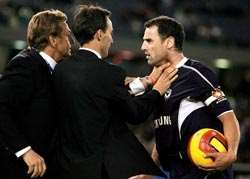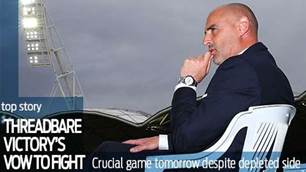Reviled by his opponents, revered by his own. Melbourne’s Kevin Muscat might divide opinion like no other player, but one thing’s for sure: you’d want him in your team.
Page 1 of 4 | Single page
For Melbourne Victory skipper Kevin Muscat some things never change.
In nearly a decade in English football the combustible Australian international was a hate figure for home fans whenever he arrived to play in an away game for one of his three clubs – Crystal Palace, Wolves or Millwall.
Muscat’s reputation as a fearsome hard man made him a poster boy for ugliness in the English game, particularly after one of his crunching challenges ended the career of Charlton Athletic’s Matty Holmes.
In a sad and ugly denouement the Holmes affair went to court, with Muscat having to pay damages to the midfielder to compensate for the ending of his career. Little wonder that, for a while, he was dubbed the most hated man in English football as the media went to town on the pugnacious Socceroo who took no prisoners on the field and asked for little quarter for himself either.
These days Muscat remains a larger than life figure in the Australian game, but his image is rather different.
Of course he is still booed by opposition fans whenever he leads Melbourne Victory out at A-League grounds outside Victoria. But these days the catcalls are now more affectionate than malicious. The contemporary, made-over Kevin is less Hannibal Lector, more pantomime villain – the sort of knowing, worldly wise bad boy that the competition might have had to invent if he didn’t already exist.
It’s almost as if fans should be shouting “He’s behind you” when the grizzled 33-year-old prepares to launch himself into a tackle in the centre of the park, the domain he has made his own this season after a late career switch to midfield paid spectacular dividends.
Off the field Muscat is a different kettle of fish. His years abroad and his success have given him a confidence and swagger. He is very much a leader at Melbourne Victory – as he has been almost everywhere he has played, including for the national team – but he is also one of the lads.
Fiercely competitive on the park, he is a frequently grinning presence off it, always quick with a sharp retort and smart one liner, a man capable of thinking quickly on his feet. Muscat is, perhaps, the best example of the impact of white line fever there is in the game.

This is no tongue-tied footballer, but a street smart individual brimming with the sort of self confidence borne from surviving a decade-long examination in the toughest school of all. Ask Muscat if he has any concerns about his image, whether he was upset when reviled by so many in the English game, whether he is disappointed with the legacy he may leave behind and the answer is as honest as it is expected.
“I can’t have any regrets. I don’t think I can. If I had one or two incidents again,” he says, his voice trailing off slightly. “You don’t like to see anyone getting injured,’’ he adds in reference to Matty Holmes, before adding “I can’t regret it because I didn’t mean any...”
The Muscat philosophy about the game is simple. Go out onto the pitch, give it 100 per cent, and then some more. Stretch the laws to the limit, get away with what you can if it benefits your team because if you don’t the other side will.
It might sound like dog-eat-dog, but for all but the most extravagantly gifted its the reality of professional football, certainly in the brutally competitive top European leagues.
“I don’t regret going out and playing as hard as I could,” he admits. “I have gone on record saying that I pushed the envelope as far as I can to the white line. There’s no two ways about that.
“My image? So be it. I maintain that every club I played for I could walk back in there tomorrow and be welcomed. I was well appreciated and well respected at all the clubs I was at because I had a stubborn attitude. I turned up on a Saturday afternoon to impress one person, and that was the manager.
“I would go out and do as close to what I was told as possible, and try and have an impact on games. It was in a different light but the fact that I could walk back to any of the clubs I have been at and be welcomed means more to me than the odd person or majority of people at other clubs who were happy to see the back of me when I left.”
In nearly a decade in English football the combustible Australian international was a hate figure for home fans whenever he arrived to play in an away game for one of his three clubs – Crystal Palace, Wolves or Millwall.
Muscat’s reputation as a fearsome hard man made him a poster boy for ugliness in the English game, particularly after one of his crunching challenges ended the career of Charlton Athletic’s Matty Holmes.
In a sad and ugly denouement the Holmes affair went to court, with Muscat having to pay damages to the midfielder to compensate for the ending of his career. Little wonder that, for a while, he was dubbed the most hated man in English football as the media went to town on the pugnacious Socceroo who took no prisoners on the field and asked for little quarter for himself either.
These days Muscat remains a larger than life figure in the Australian game, but his image is rather different.
Of course he is still booed by opposition fans whenever he leads Melbourne Victory out at A-League grounds outside Victoria. But these days the catcalls are now more affectionate than malicious. The contemporary, made-over Kevin is less Hannibal Lector, more pantomime villain – the sort of knowing, worldly wise bad boy that the competition might have had to invent if he didn’t already exist.
It’s almost as if fans should be shouting “He’s behind you” when the grizzled 33-year-old prepares to launch himself into a tackle in the centre of the park, the domain he has made his own this season after a late career switch to midfield paid spectacular dividends.
Off the field Muscat is a different kettle of fish. His years abroad and his success have given him a confidence and swagger. He is very much a leader at Melbourne Victory – as he has been almost everywhere he has played, including for the national team – but he is also one of the lads.
Fiercely competitive on the park, he is a frequently grinning presence off it, always quick with a sharp retort and smart one liner, a man capable of thinking quickly on his feet. Muscat is, perhaps, the best example of the impact of white line fever there is in the game.

This is no tongue-tied footballer, but a street smart individual brimming with the sort of self confidence borne from surviving a decade-long examination in the toughest school of all. Ask Muscat if he has any concerns about his image, whether he was upset when reviled by so many in the English game, whether he is disappointed with the legacy he may leave behind and the answer is as honest as it is expected.
“I can’t have any regrets. I don’t think I can. If I had one or two incidents again,” he says, his voice trailing off slightly. “You don’t like to see anyone getting injured,’’ he adds in reference to Matty Holmes, before adding “I can’t regret it because I didn’t mean any...”
The Muscat philosophy about the game is simple. Go out onto the pitch, give it 100 per cent, and then some more. Stretch the laws to the limit, get away with what you can if it benefits your team because if you don’t the other side will.
It might sound like dog-eat-dog, but for all but the most extravagantly gifted its the reality of professional football, certainly in the brutally competitive top European leagues.
“I don’t regret going out and playing as hard as I could,” he admits. “I have gone on record saying that I pushed the envelope as far as I can to the white line. There’s no two ways about that.
“My image? So be it. I maintain that every club I played for I could walk back in there tomorrow and be welcomed. I was well appreciated and well respected at all the clubs I was at because I had a stubborn attitude. I turned up on a Saturday afternoon to impress one person, and that was the manager.
“I would go out and do as close to what I was told as possible, and try and have an impact on games. It was in a different light but the fact that I could walk back to any of the clubs I have been at and be welcomed means more to me than the odd person or majority of people at other clubs who were happy to see the back of me when I left.”
Related Articles

Threadbare Victory vow to fight

Muscat's five star reception for rivals













